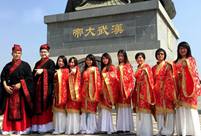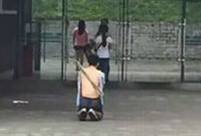

MAKIT, Xinjiang, July 7 -- Su Guoping was working for days to help farmers divert water from wells to parched fields in Kumkuduk, a village on the edge of the Taklimakan Desert in northwest China's Xinjiang Uygur Autonomous Region.
One of the officials dispatched to Xinjiang's rural areas to help improve the livelihood of local residents, Su mixed his sweat among farmers and village officials to get the task done.
"Water shortage can affect this year's harvest. There is no time to delay. We must help the farmers," said Su, deputy director of Xinjiang Economic and Information Commission.
Su lives in Urumqi, capital of Xinjiang, before joining a program that began in March last year to send 200,000 civil servants to live and work at over 8,000 villages, 700 state farms and pastures, and 1,000 communities in the vast region for a one-year term over the course of three years.
He and eight more peers became neighbors with Uygur villagers in Kumkuduk, trying to understand what the villagers need and then give assistance.
Su said working in rural villages is a good way for cadres to accumulate grassroots experience and help improve the life quality of the local residents, though it's not always easy.
Emer Abla said the fields in his village have had an acute lack of water after the wells dried up a few years ago. Su and his colleagues turned to construction workers and local electric power department for help. With the help, a new well was built and irrigation ditches built, bringing water to the otherwise barren fields.
At the beginning, villagers were reluctant to trust the newcomers. An elderly man named Musataji turned a cold shoulder on Su multiple times when he tried to talk with Musataji.
"He was not willing to tell us his troubles, as he thought it was useless and may result in troubles," Su said.
Su then changed their working methods and started to have talks with the farmers in the fields and help them clean yards and roads.
"These cadres are modest, hardworking, and hardy. We are like brothers," said Dawut, head of Kumkuduk Village.
Now, more and more villagers are willing to turn to these officials for help. "The rural life has also provided an opportunity for us to understand grassroots living conditions and their demands," Su said.
Civil servants sent to the rural areas are expected to help local residents solve problems and improve their living conditions. The three-year-long campaign aims at enhancing the relationships among different nationalities while improving the cadres' abilities and cultivating good virtues, according to Pu Shiyu, deputy director of the organization department of the regional committee of the Communist Party of China.
The cadres also help farmers and herdsmen increase income, maintain social stability and promote religious harmony during their rural experience, Pu said.
With their expertise, Su Guoping and his colleagues have helped the villagers obtaining financial aids to raise sheep, and to open a textile mill and a clothing plant.
So far, the first batch of the designated civil servants, including 262 provincial level officials, have finished their service in the rural areas.
 Evolution of Chinese beauties in a century
Evolution of Chinese beauties in a century Creative graduation caps of ‘vigorous elves’
Creative graduation caps of ‘vigorous elves’ Typhoon class strategic Submarine in photos
Typhoon class strategic Submarine in photos Hong Kong college students feel the charm of Hanfu
Hong Kong college students feel the charm of Hanfu Japan’s crimes committed against "comfort women"
Japan’s crimes committed against "comfort women" Odd news:“carrying a rod and asking to be spanked”
Odd news:“carrying a rod and asking to be spanked” Legendary life of a bee-keeping master in Hainan
Legendary life of a bee-keeping master in Hainan 4-year-old cute 'monk' spends summer holiday in temple
4-year-old cute 'monk' spends summer holiday in temple Hong Kong in lens
Hong Kong in lens Editorial: An uncertain road ahead for Greece and EU
Editorial: An uncertain road ahead for Greece and EU China’s class of 2015 gets creative with graduation photos
China’s class of 2015 gets creative with graduation photos Girl power on the pitch
Girl power on the pitch Giant panda Yuanzai turns two at Taipei Zoo
Giant panda Yuanzai turns two at Taipei ZooDay|Week